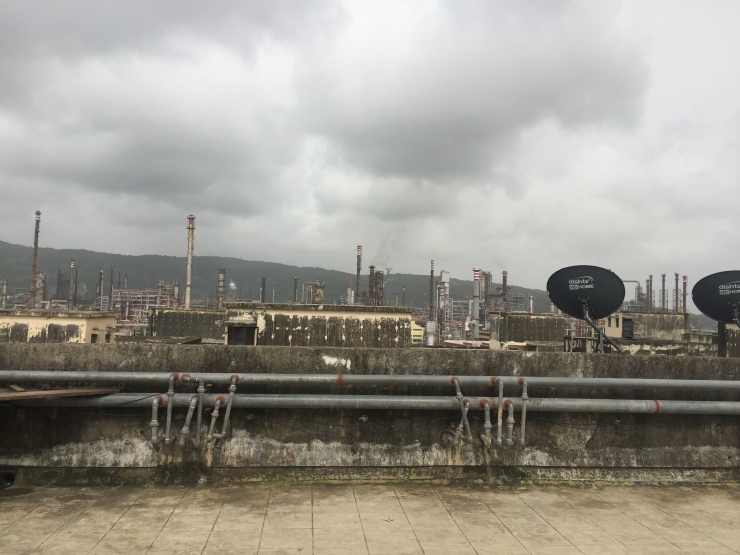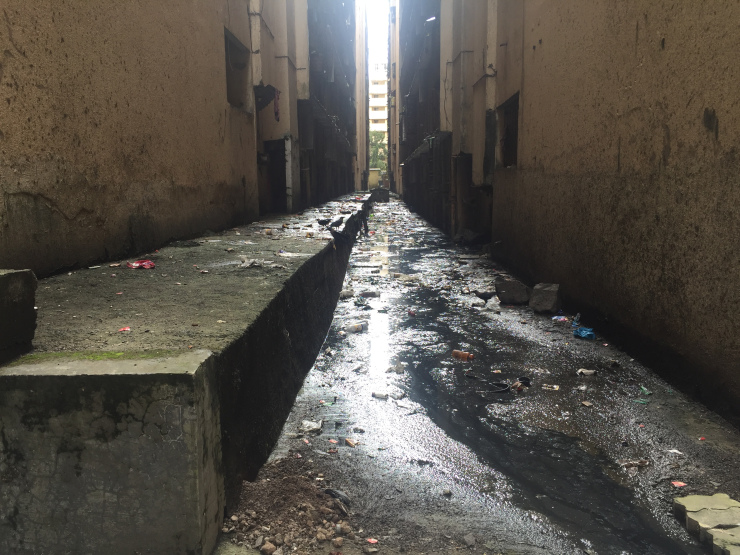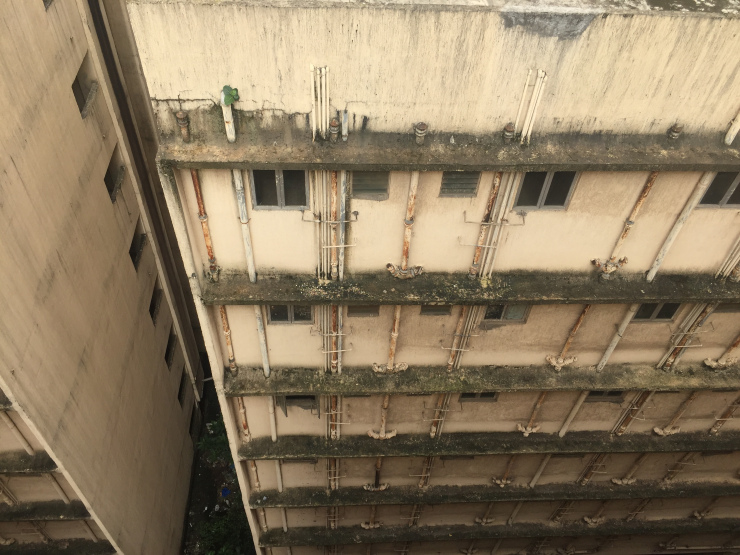Migrant Mumbai is a series of documentary films created by the Batch of 2017-19 of the School of Media and Cultural Studies at the Tata Institute of Social Sciences, Mumbai, as a part of their course, Working With Video-II (course teachers and mentors: Anjali Monteiro and KP Jayasankar).
Mumbai is a city of migrants, built on their sweat and blood. Some migrants are deemed citizens, and others remain migrants forever, denied their rights to the city. This series explores the lifeworlds of these “other” migrants.

The making of these films has been supported by a grant from the Murthy-Nayak Foundation
Migrant Mumbai – The Film Series
Aashiyana
Directors
Kavya, Medhavi, Megh, Prgya and Vivekina
Synopsis
Based in Tata Nagar, the film looks at the resistance of the residents against CIDCO and the state. CIDCO plans to construct a public library, in the area where Tata Nagar is situated. However, the residents have decided to fight for their rights in the Court. It brings in the everyday life of the settlement along with the many struggles they face, such as those surrounding water, electricity etc.
Director’s Note | Background Note
Bhojpuri Bambaiwale
Directors
Aayush Chaturvedi, Jyoti Nisha, Mayura Choudhari, Yamini Nibhanupudi, Yaniam Chukhu
Synopsis
Migration as a term, has always been associated with either hope or helplessness. When one moves to a city in search of work, it is either with the hope that they’ll make it for their family, or with the helplessness of not being able to do anything back at home for themselves. ‘Bhojpuri Bambaiwale’, a film by Aayush C, Jyoti N, Mayura C, Yamini N, and Yaniam C, is an attempt to explore migration through the eyes of Migrants from Uttar Pradesh and Bihar, and the effect that Bhojpuri cinema has on them when they are miles away from their homes. It explores how impactful cinema is when it comes to connecting people to their lives back home and through the eyes of our subjects, as well as through scenes from different Bhojpuri films.
Director’s Note | Background Note
Ghutan
Directors
Chinar Mehta, Harikrishnan HG, Pallavi Khare, Yogiraj Bhende
Synopsis
The film begins by introducing Anita Dole, a resident at the Mahul slum rehabilitation buildings and an activist associated with Medha Patkar’s ‘Ghar Bachao Ghar Banao’ movement, a campaign to ensure proper rehabilitation to the displaced poor. Ms Dole offers an brief overview of the rehabilitation project and some of the health concerns faced by its residents. As the film progresses, more residents are introduced and reveal the hazards they face and the afflictions they developed as a result of the unsanitary living conditions in the buildings. Poor water and air quality have led to severe illnesses among residents, including tuberculosis, pneumonia, and even cancer. These anxieties were heightened by the explosion at the BPCL refinery in August, which left 43 people injured. While the government has currently stopped relocating residents to Mahul, those who already live here continue to struggle. But in early 2017, a group led by Ms Dole began a campaign to be relocated to areas with better living conditions. This campaign, which initially began with 30 residents has now become a part of activist Medha Patkar’s nationwide ‘Ghar Bachao Ghar Banao’ movement.
Director’s Note | Background Note
Na Feriwala Kshetra
Directors
Himanshu Saikia, Jahnavi Reddy, Rachel Alexander, and Timmayo Thumra
Synopsis
Sunita, Meera, and Dinesh are first-generation immigrants from within the state of Maharashtra and beyond, who work as vegetable and fruit vendors in Belapur, talk about their experiences of migration and survival in Navi Mumbai.
The film is an attempt to understand the experiences of Dinesh, Sunita, and Meera in migrating to Navi Mumbai, a city which they drive and sustain, but also a city which by design, denies them their right to occupy it with safety and dignity. How is the city designed to affect the experience of immigrants? How does it affect basic rights like education and housing? How is the precariousness of migration multiplied with the hostility of civic bodies towards hawkers? Why does the law meant to protect their right to livelihood fail them? Accompanying Sunita, Meera, and Dinesh to their homes, wholesale markets, and their place of work across the Konkan Bhavan in Belapur, these are some questions the film begins to ask.
Director’s Note | Background Note
Navi Mumbai, Navi Begari
Directors
Aishwarya Vasudev, Subodh Wasnik, Ankit Pareek, Meghna Nandy
Synopsis
The Nakas of Navi Mumbai are an embodiment of the bustling vibrancy that defines the city. They happen to be the site of many different kinds of economic activities on a daily basis one of which is the recruitment of informal construction workers for various developmental projects and construction work happening around the city. The film follows the lives of the construction workers vis-à-vis the nakas and explores the Nakas as a space. A large percentage of these workers are first, second or even third generation migrants to Mumbai coming from different states like Bihar, Karnataka, Rajasthan, Andhra Pradesh etc and also from far flung areas within Maharashtra. Although the construction sector contributes a considerable percentage to India’s GDP, most of the labour involved in this industry is casual and informal which, needless to say, comes with a multitude of vulnerabilities and social issues that the workers have to deal with every day. The film tries to bring these daily issues of lack of work, registration delays, pay cuts, health issues etc to the attention of the audience. The film also tries to explore the domestic spaces of the workers and aspects like differences in the work profile of men and women workers, the latter also being burdened with the responsibility of raising children and looking after daily household chores. Working in close collaboration with YUVA, an NGO working around the issues of the construction workers, the film also heavily draws from their inputs and work. As the narrative navigates through the nakas and the settlements of the workers we come across different stories from the men and women workers, the women in the domestic spaces, and the NGO workers from YUVA about the socio-political realities, vulnerabilities, precarities, work environment, policy measures and experiences with the government machinery that have come to define the lives of the workers.
Director’s Note | Background Note
Dere tun Dilli
Directors
Divya Cowasji, Shilpi Gulati
Synopsis
‘Dere tun Dilli’ is a film about storytellers who weave history in the everyday. Storytellers, who tell tales of a divided country, of struggles across borders and of lost and found homes. Storytellers, who try to remember, keep a collective memory alive and who often forget. ‘Dere tun Dilli’ is a journey through time, through Dera Ismail Khan and Delhi, through memory, living and forgetting.
2011 | 27 minutes
A Foreigner In My Own
Directors
Nishajyoti Sharma
Synopsis
Nepalis (Gorkhas) of Assam are not foreigners or outsiders, except for few who may have migrated to Assam (India) post 1971. However, the prevalent sentiment among the Assamese masses is quite contrary to what history says and the Assam Accord of 1985 has agreed to.
Through this self-reflexive film, the filmmaker (who herself is an Asameli Nepali/Gorkha) explores the notion of identity of the community in Assam. The film encompasses the feelings of a common Asameli Nepali person regarding her/his own identity and her/his standing in the Axomiya society, the politics surrounding the ‘identity issues’ in Assam and the degree of assimilation by an Asameli Nepali to prove ones projected notion of identity and loyalty.
20117| 65 minutes


